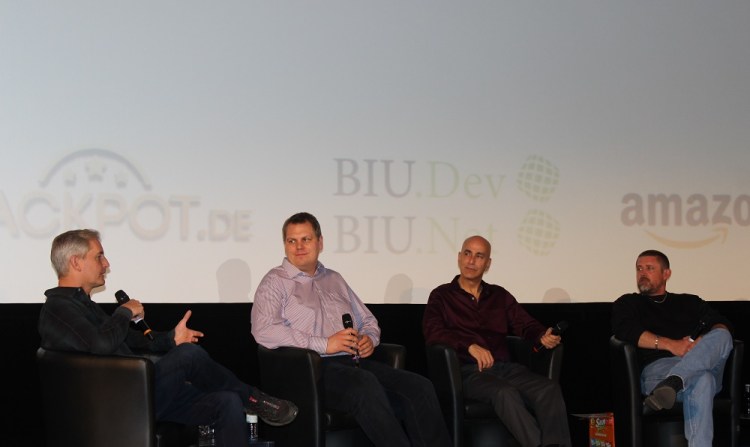Schofield: I hear different things. “I don’t want to do a mobile game.” “I don’t want to do a console game with 250 people.” I think that’s the wrong attitude. The attitude should be, “I want to get into the game industry.” Once you get in, we want to keep you in, because you have experience. Whether you’re making a mobile or a console game, you’re making a game for a living. There’s something good about that.
Falstein: I hear about that all the time too. “I can’t decide if I should apply to this company or that company.” Apply to all of them! Get yourself some offers and then you can decide. Then you can be picky. If you only get one, that’s where you’re going.
GamesBeat: Why would Google be an interesting place to wind up if you’re a games person?
Falstein: Google has certainly not been the first company people think of as a game company. On the other hand, we support games pretty much across the spectrum, more so than any single company. We have Android, the mobile platform. Just in the last year we’re also introduced Android TV, Project Tango, Project Cardboard, lots of exciting ways people can make games of all types, from consoles and mobile to virtual reality.
I do get a lot of people asking, “Hey, you’re Google, are you making games? What can I do to help?” Google is a big enough company that even a small percentage of it making games means there’s a fair number of game jobs. I point people at our website for that, because I never even hear about the majority of them, the company is so big.
The reality is that we’re moving into a future where games are increasingly very expensive. The other piece of it is that the handful of games those triple-A companies were making were almost all sequels, or the same five genres. The big question is, do you do a science fiction or a fantasy shooter this time?
I think we’re in a bright time that way. Having the kind of breadth of what we can do is a big part of what Google is behind, making it possible to have an even wider range of games and get them in the hands of the next billion people who will be coming online in the next five years. I’m really excited to find out what happens to adults who get their first smartphone next year. I’m sure they probably won’t spend their money on just games, but if that’s not the second thing they download I’ll be surprised.
GamesBeat: We’re starting to hear some indirect criticism of the triple-A business – the death of consoles, the shrinking of triple-A, fewer jobs left available. The choice that’s left may be, do you make sequels for the rest of your life? Competition is starting to show up in the form of Android microconsoles or cloud gaming. How do you apply some of the learnings of having been through platform and cycle changes to what’s happening today?
Fries: There are some things you see happening over and over again. A platform comes out. The early adopters do really well. Things start to get harder. A lot of people rush into the market. Budgets go up. You get consolidation. When it gets harder people react in certain ways. Sometimes they start to do more sequels, more copying, more brands. We’re starting to see more of that in mobile. People say, “I love your attitude. Let’s be more creative.” That’s the right approach, but an easier approach is to say, “Oh, no, we just have to go get a strong brand and do the Kim Kardashian game or whatever.”
So there are things you see that are the same. At the same time, you can’t rely too much on that history. Free-to-play is different. Digital distribution is different. Trying to find the line between those two is difficult.
Schofield: Can I ask you guys a question? A lot of the games that I see—My family plays so many of these mobile games, and I look at them and I think, “I made that game 14 years ago on the Super Nintendo Entertainment System (SNES).” Playing some of these games like Plants Vs. Zombies, first it’s all 2D painted sprites. Then they’re 3D rendered sprites. Is what happened in the console business going to eventually happen in the mobile business? Is the consumer going to say, at some point, “I’ve played the 2D side-scroller for a while. I’ve played the top-down shooter. I want a big immersive world now”? Or is that not going to happen?



